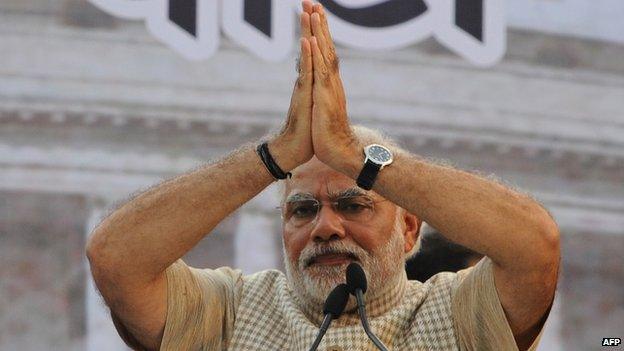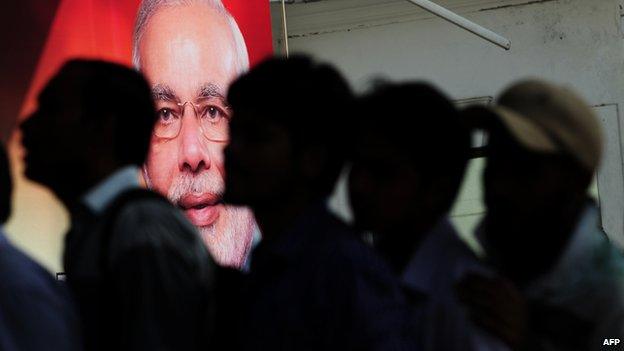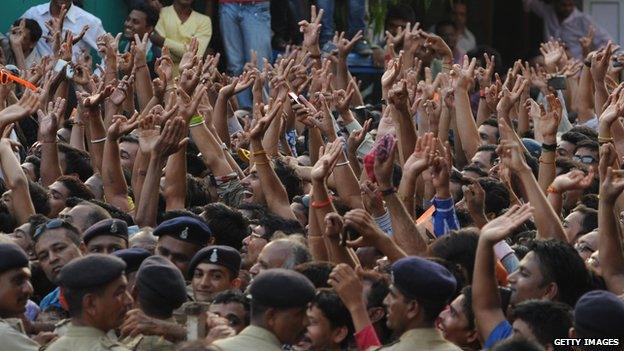Narendra Modi: India's economic saviour?
- Published
The BBC's Sameer Hashmi takes a look at what economic challenges Prime Minister elect Narendra Modi may face
A "king among kings" is how Anil Ambani, one of India's leading industrialists, described Narendra Modi in January last year, long before the latter entered the race to become the country's next prime minister.
After winning the Indian election comprehensively, the business community here is waiting with its arms wide open to embrace Mr Modi.
They hope he will be their saviour at a time when the economic growth rate is flagging, investments are dwindling and consumer demand is dropping.
He was the chief minister of Gujarat for over 12 years, during which the state's economy grew at annual average of nearly 10% and became a magnet for investors.
He has built a reputation of being a pro-business, decisive and hands-on political leader who can get things done - the polar opposite to how many saw the outgoing government of Manmohan Singh in its final years in charge.
"The industry is looking for strong leadership that can bring in clarity and give confidence," says Sunil Kanoria, vice-chairman of SREI Infrastructure Finance.
"And Narendra Modi is that leader."
It is not only the business community that thinks he is the man who can fix the economy - a large section of Indian voters believe so and that is why they voted out the last government.
Mr Modi pitched his economic track record in the state of Gujarat as his main selling point during the course of the election.
But when it comes to turning around India's economy, the prime minister-designate faces some key challenges.

Mr Modi faces significant challenges in revitalising India's flagging economy
Faster job creation
One of Mr Modi's main pledges was job creation.
More than half of India's population is under the age of 25. Every year, more than 10 million jobs are needed to absorb newcomers into the labour market.
This means India has to achieve a yearly economic growth rate of 7-8%. The last government failed to meet that target - latest data shows that between 2004-05 and 2011-12, India created just 53 million jobs.
A report by the credit rating agency Crisil traces two key reasons for this - inflexible labour laws and a shift in growth pattern towards less labour-intensive jobs such as IT and IT-enabled services.
Economists point out that India needs a two-pronged approach.
The government needs to give manufacturing a big push, and along with that, it needs to devise policies that will encourage medium- and small-scale businesses.
If this combination works, then that will help in creating more employment.
Clearing infrastructure bottlenecks
One of the biggest limits on economic growth has been India's infrastructure.
Given the frantic pace of growth between 2004 and 2010, India needed consistent investment in infrastructure, which would have acted as a cushion even when the economy started to slow down.
But instead, red tape and environmental issues stalled many projects.
Even though in 2013 the government did set up a high-powered committee - headed by Prime Minister Manmohan Singh - to improve things, it was too little too late to show results.
As of February 2014, the government had cleared 310 projects worth nearly $100bn (£60bn).

India needs to boost its economic growth in order to create jobs for those entering the labour market
However, many more are still waiting for final clearance. If the new government acts fast, then some can be completed within a few months.
"It's an art to identify projects that can have a big impact," says Samiran Chakraborty, chief economist at Standard Chartered Bank India.
"If the new government can pick 20 such projects in the next few months, then that will have a ripple effect."
High food prices
Rising food prices were one of the key reasons for the huge electoral rout of the outgoing Congress-led government.
India's central bank has been waging a war against inflation for the last two year by keeping interest rates high, but this has come at the cost of economic growth.
Last November, food price inflation touched almost 20%. Economists point to various reasons for this sharp rise.
Demand for food like eggs and milk in villages has gone up in recent years due to rising incomes in rural areas. Inconsistent rainfall has also hit crop yields, pushing up prices.
If the government can improve storage facilities, that will go a long way in controlling food prices. A lot of food gets wasted by poor storage conditions, which leads to higher prices during the off-season.
The other big factor is hoarding. Many traders keep back their produce until the prices rise - something the government has long been criticised for not cracking down on.
Encouraging foreign investors
Investment by both international and domestic firms has come down over the last few years. Even though foreign direct investment did go up in 2013, the sentiment has largely been sceptical.
Some of the steps taken by India in recent years were seen to be unfriendly for foreign businesses. A bitter tax row with Vodafone and policy flip-flops have made investors apprehensive.
And to add to that, India is regularly ranked as one of the toughest places to operate - currently 134th on the World Bank's "ease of doing business" list.
"The government's immediate priority should be to improve ease of doing business in India," says Adi Godrej, chairman of the Godrej Group, one of India's largest conglomerates.

Many Indians hope Mr Modi will be able to deliver on his campaign promises on their country's economy
Challenges ahead
So can Narendra Modi deliver?
"We need a leader who can get things done," says infrastructure expert Mr Kanori.
"It doesn't matter whether it's achieved by a dictatorial approach or by consensus building. And Modi is that leader."
Clearly the task ahead for Mr Modi is going to be challenging.
But the business community is confident that he has the recipe to fix the economy and lead them to a brighter future.